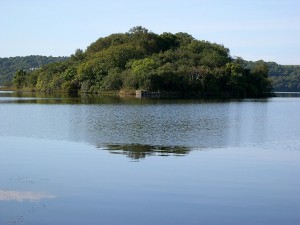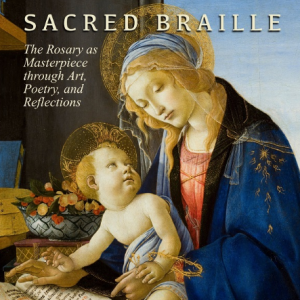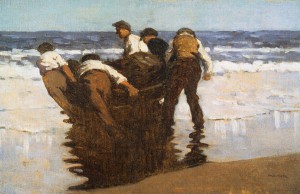Happy 150th Birthday, W.B. Yeats!
You are cordially invited to a birthday party. Here’s how to celebrate: Come alone at night, row to an island in the middle of a lake. Like John the Baptist in the wild, you will dine on honey. The air is a-pulse with the sound of bees, but you don’t mind them and they don’t mind you. Though you arrived alone, you will soon realize the island is abounding with other souls, quiet in their festive outcry of peace. Best of all, each soul there is like family. Each of them has received the same invitation: to follow the path to the deep heart’s core. Is this heaven or is this a poem?

June 13, 2015 will mark the 150th birthday of the great Nobel prize-winning poet, W.B. Yeats. What finer gift could we give the great Irish bard than to read his poetry, and thus again hear his voice? My way of a birthday gift for this milestone year will be to write about what Yeats has meant to me.
Yeats’ birthday is important to me on several levels. I am one of the waves lapping at the shore of Innisfree—an Irish-American poet with familial ties to Sligo. As such, Yeats’ legacy has tugged at my heart. His family had roots in Sligo, and he could write the hell out of a poem.
I’m featuring my favorite of his poems. It has what another of my favorite writers, the Irish-born and bred C.S. Lewis, would have called “Sehnsucht,” a German word meaning deep, bittersweet longing. This kind of longing is the stuff that faith is built on, reminding us that in the outcry of St. Augustine to God, “the heart is restless until it rests in thee.”
The Irish, as a people, understand deep longing. Oppression, famine, the Irish Exodus of millions, combined with an uncanny and singular beauty all the Emerald Isle’s own, has led to a treasure trove of music, art and poetry. Just listen to the keening of the Irish uileann pipes.
That same haunted cry lives in the soul of many an Irish-American, at least every Irish American I’ve known. It is the cry of the lost child. Though fiercely proud Americans we are, there is a part of us that longs for our Ireland, whether or not we’ve ever set foot on Irish soil. Maybe it’s something about the land’s verdant beauty, a green so electric it pierces the darkness of a rain-soaked evening. Maybe it’s something about the combination of a place rooted in pagan lore and profound Catholic legacy. Perhaps it’s the glimmer in the eye of every true Irish woman and man, the one that says: “Stay awhile. I’ve a story to tell and so do you.” Certainly then, Ireland is the most naturally poetic place on earth. It is no wonder that Yeats, Ireland’s greatest poet, speaks to our “deep heart’s core.”
Yeats gave a resounding poetic voice to a poetic people. When he writes, “I will arise and go now, go to Innisfree,” we inwardly arise too. “Innisfree” is an uninhabited lake isle in Logh Gill. But metaphorically, Innisfree can be any place the soul longs for and finds rest, where “peace comes dropping slow.” Where is that place for you? This poem is a summoning as the reader allows his or her “Sehnsucht,” to float upward as though we have lifted off the box from its waiting balloon. What makes this poem even more special to this Irish-American is that it evokes the land my predecessors left, but loved. My grandmother remembers her Irish grandfather sighing softly, “The butter here just isn’t like the butter from home,” even as her grandmother held up the newborn babies, proudly exclaiming, “Welcome! And how do you like America?” That is the braided inheritance of the Irish American: American pride, Irish longing. Ultimately, there is always a lost part of us that yearns for Ireland. Perhaps that’s why, if you get a bunch of us together and have us sing Irish songs, the tears and the poetry will flow. (So might the Guinness.)
Happy Birthday, William Butler Yeats. See you on the isle.

